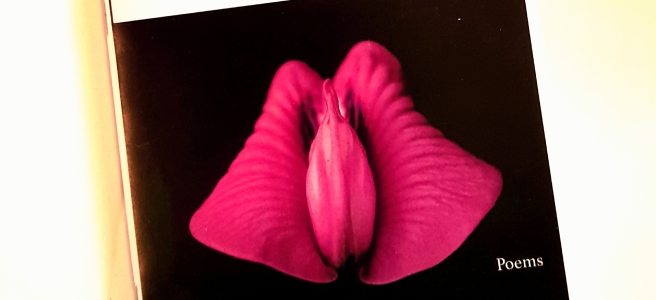“For what is sexuality if not nature?”
Each Wild Thing’s Consent, by Lauren Davis
When Lauren Davis read from her chapbook, Each Wild Thing’s Consent (Poetry Wolf Press, 2018), at Imprint Books in Port Townsend WA, where she works as a bookseller, I understood why she chose to read the less risky poems in this very daring chapbook, but I’ll admit I was disappointed. When the first poem in a Table of Contents is titled “Vulvodynia,” you’d really have to trust your audience. But to her crafty credit, Davis intersperses poems about sexual encumbrance with gorgeous, very Pacific Northwest nature poems. And it renders everything enticing, as it should be. For what is sexuality if not nature?
On the other hand, you can’t look at the book’s cover (a photo with the understated title “Red Petaled Flower in Selective-color Photography,” credit: Donald Tong) without thinking of vulva. As with a Georgia O’Keefe painting, you can’t look without gazing, or gaze without longing. And here is where the marriage of wild life and the external female genitalia is clinched.
But I’m teasing you intentionally. Of course, you want a review to tell you about the poems. Simply stated, they are about a woman’s life, her partnership with a compassionate man, their wildlife treks, and her physical inability to have sex without pain. In these poems, there is something very natural, very sad, and very beautiful about the woman’s plight, a tango of words and their meanings:
Vulvodynia, vulvar vestibulitis, vaginismus—
they sound like the names of flowers, beautiful ones.
Davis’ imagination leans towards the outdoors, where of course, there is often danger, but always grandeur. She names the vagina ‘cave’ and makes a spider web of the body. In “Cave Study,” she begs the question:
What exhausted spider slogs along inside
my body, assembling her last home?
If you come for me, love, you will catch
at my cave’s mouth, rip her long assignment.
Overwhelm the web—I am full
of faith. Silk sticky, seek my grotto’s fingertips.
The craft in Davis’ descriptive lyricism is remarkable. Her gift to us in these poems is to not linger in gloom, but to transform it. The poems are mostly in couplets—Davis’ nod (more than a nod, really) to the partner who accepts the problem as spouse cares for spouse, as mother nurses infant—with affection, humor and patience. In “Vaginismus” Davis offers this lament,
What is this body if I cannot—
when full of desire—join with a man.
I have waited so long to find you.I told the sky prayers. And the sky
listened. When I fell out of the trees
strangers showed mewhere you dwelled. Now that I
have brought myself to you
I cannot bring myself to you, fully.
Then, in “I am a New Caledonian Owlet-Nightjar,” there is this benediction,
No one has heard my voice but you—
a different genus of bird
who sought and discovered meI beat my wings against yours
unable to mate but lookhow groomed my semiplumes
Creating lyricism from chronic pain is a remarkable feat. Davis’s exploration is deep and wide; it includes forays into the woods and travels to basilicas. It notices death as an arbiter of what is truly important. “In the Forest by the Bay,” Davis informs us,
Grey beard, furrows, arthritic feet.
I know enough to know I must imagineyou dead, that every day has its own
grief, understanding we cannot go on this way—
living
While writing this review, I happened upon a superb poem titled Vulvodynia by Ellie White online at Foundry. What a rare coincidence! In fact, the popular and medical literature of vulvodynia is hardly inspired. There exists a National Vulvodynia Association (the you-are-not-alone source for women with the condition); numerous vulvodynia products and self-help books for sale on Amazon; a heavy metal band with the name; studies in peer-reviewed medical journals; a vulvodynia Pinterest page; and, of course, personal-journey blogs.
What distinguishes poetry from information is what we call lyricism. Davis’ poems have the softness of a featherbed and the sharp edges of quills. You will have to read through this short set of poems at least twice, to really take in what she is doing here. Each Wild Thing’s Consent is a transformative work. If I may be excused for trying to paraphrase a “take-home message” in these lush poems, it’s that a poet with her skill can make you think twice about everything you find on the plate you call your life. Everything. And then some.
Yes, my love, we belong, but on soil stained knees,
asking for each wild thing’s consent to stand.
Review by Risa Denenberg
Sources
https://www.pexels.com/photo/abstract-art-bloom-blossom-204959/
https://www.nva.org/
https://www.ncbi.nlm.nih.gov/pubmed/27607347
https://www.foundryjournal.com/ellie-white.html
 Lauren Davis is the author of Each Wild Thing’s Consent (Poetry Wolf Press). She holds an MFA from the Bennington Writing Seminars, and her poetry, essays, and stories can be found in publications such as Prairie Schooner, Automata Review, and Empty Mirror. Davis teaches at The Writers’ Workshoppe in Port Townsend, WA, and she works as an editor at The Tishman Review.
Lauren Davis is the author of Each Wild Thing’s Consent (Poetry Wolf Press). She holds an MFA from the Bennington Writing Seminars, and her poetry, essays, and stories can be found in publications such as Prairie Schooner, Automata Review, and Empty Mirror. Davis teaches at The Writers’ Workshoppe in Port Townsend, WA, and she works as an editor at The Tishman Review.
Buy this chapbook!!
Purchase the PDF here: https://poetrywolfpress.bigcartel.com/
It’s available for $10.00 at The Writers’ Workshoppe and Imprint Books
OR order a signed copy from Lauren. Contact: LaurenDavis802@yahoo.com
(add $3 for shipping)
Risa Denenberg is the curator at The Poetry Cafe.
She is a co-founder and editor at Headmistress Press and has published three full length collections of poetry, most recently, “slight faith” (MoonPath Press, 2018).


2 thoughts on “Each Wild Thing’s Consent”